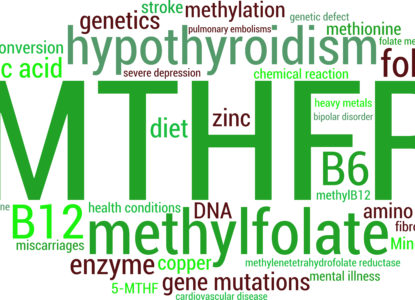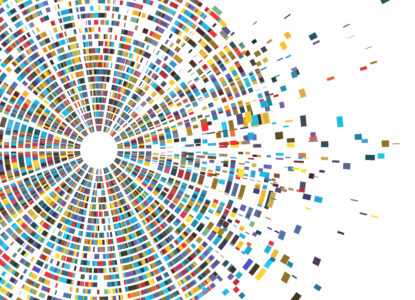Worrier vs. Warrior Gene: How COMT Activity Affects the Stress Response
Article at a Glance
- The COMT gene variant that determines worrier vs. warrior status is rs4680. This variant plays a role in how dopamine is metabolized in the brain.
- The Worrier genotype is rs4680 A/A.
- The Warrior genotype is rs4680 G/G.
- Those who carry one copy of the A allele and one copy of the G allele are hybrids.
Genes Mentioned

Contents
Have you ever wondered why some individuals pursue combat sports for a living, and seem so comfortable doing so? What can explain the fearlessness of members of our military, in those who practice martial arts, and in the daredevil skiers who compete in the winter olympics?
Although we can’t attribute every courageous act to genetics, there is some evidence that traits such as bravery and fearlessness are etched into your genes. In fact, depending on the type of variant you possess in a gene called COMT, you could be classed as either a “warrior” or a “worrier.”
How does the COMT gene create worrier and warriors?
The COMT gene regulates dopamine, a neurotransmitter in the frontal section of your brain.
The COMT gene encodes an enzyme called called catechol-O-methyltransferase that functions to break down dopamine after its release. This process ensures that just the right dopamine concentration binds to and activates the next neuron. If too much dopamine binds, an increase in impulsive and aggressive behavior is observed. However, if too little binds, depressive/anxious behaviors occur as a result.
COMT variants can therefore be used as molecular genetic markers associated with anxiety, pain, and stress response, however it’s important to note that these variants are common. They cannot be considered defining factors in the development of all mental states, as multiple factors have been shown to play a role.
The COMT variant that determines worrier vs. warrior status is rs4680. The SNP is defined by an amino acid substitution of methionine (Met) in place of valine (Val) at position 158 (Val158Met). Depending on your gene copy number, you could be classed as a worrier (A genotype), a warrior (G genotype), or a mix of the two (AG genotype).
Note: the AG genotype can be both a warrior and a worrier! We test for COMT status as part of our custom nutrition plan product.
The Warrior Genotype – rs4680 G/G
Warriors genotype traits:
- Perform better under stress
- Exhibit greater emotional resiliency
- Have lower anxiety
- Lower attention span and attention
A recent article in The Journal of Sports Science and Medicine found that elite mixed martial arts athletes possess the warrior genotype of the COMT gene when compared to the non-athlete control group. This variant confers resilience to stress as well as an emotional advantage over individuals with the worrier genotype. Additionally, this genotype also confers protection against anxiety and pain susceptibility in these individuals, providing the perfect combination of traits to engage in combat sports.
One study looking at the influence of COMT genotype on measures of perceived pain and state/trait anxiety found that warriors secreted lower amounts of a stress marker in their saliva during stressful situations, and that the warrior allele affords an emotional advantage relative to worrier allele carriers.
The warrior genotype has other benefits, such as having more empathy, prosocial behavior, and the ability to process unpleasant stimuli; however, warriors were worse in memory and attention tasks when compared to their worrier counterparts.
It has been observed that warriors thrive in stressful working environments that require a high level of performance. They are emotionally resilient and work well under pressure.
The Worrier Genotype – rs4680 A/A
Worrier genotype traits:
- Heightened cognitive performance
- Sustained attention
- Greater anxiety and stress
- Harm avoidance > novelty seeking
According to this Nature study, the worrier genotype of the COMT gene has been characterized as having heightened cognitive performance at the cost of greater levels of anxiety and vulnerability to stress. In other words, these individuals have better short-term memory, sustained attention, and perform better in several tasks, however, this heightened performance is met with significant anxiety and an elevated stress response.
When assessing fear processing in these individuals, one study found that the worriers exhibited a significantly heightened startle reflex compared with the warriors, and gravitate toward harm avoidance, as opposed to the novelty seeking, as observed with the warrior genotype.
Further, it was observed that worriers were relatively vulnerable to adversity, but responsive to constructive leadership in the working environment. The propensity for worriers to feel stressed doesn’t mean that they should avoid all stressful activities, though. In college students, those that were classed as worriers had significantly higher resilience when compared to their warrior counterparts, which combined with other evidence, suggests that these individuals need low, gradual exposure to a task and should take time to acclimate to the pressure through experience. In other words, consistent exposure to a stressful task will see these individuals excel.
Nutritional factors that could affect COMT activity
Since the COMT enzyme works differently in the worriers vs. warriors, certain dietary or lifestyle modifications can be incorporated to benefit the genotype to ensure optimal cognitive performance.
For example, if you’re a worrier you may be more sensitive to wine, coffee, and green and black tea. This is because they contain catechols that can affect dopamine production in the brain, which could increase feelings of anxiety. Therefore, reducing your intake of these catechols could be beneficial in that regard.
Warrior genotypes on the other hand should increase their dietary catecholamines to provide a dopamine boost to get through low-pressure, monotonous tasks. These individuals also benefit from high-intensity exercises that have a ‘thrill’ element to them, such as mountain biking, snowboarding, skiing, and mountain biking to name a few.
The bottom line
The COMT gene and its variants, therefore, determine which environments and circumstances we are better equipped to handle by regulating fluctuations in our dopamine levels in response to stress.
This will either group you as a warrior, enabling you to perform at your highest level with pressure, deadlines, and thrills, or as a worrier, enabling you to thrive in low-pressure, quiet environments to work on complex issues for an extended period.
Although there have been links with these variants to several mental conditions, these links are not definitive and include other factors such as sex, environmental inputs and other gene interactions to develop such conditions. Genes are not the whole story.
For more reading on this topic, also consider reading our write up on the warrior gene.



